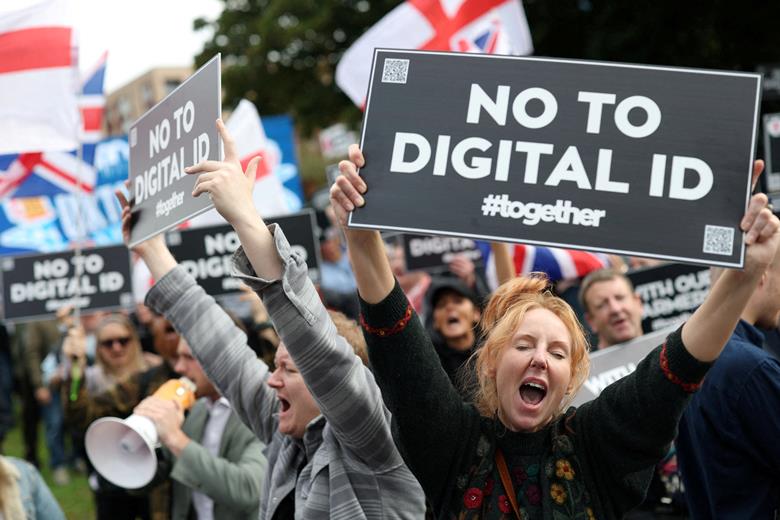
Digital IDs and the Mark of the Beast Explained
Share
“He causes all, both small and great, rich and poor, free and slave, to receive a mark on their right hand or on their foreheads, so that no one may buy or sell unless he has the mark…”
— Revelation 13:16–17 (ESV)
In recent years, governments around the world have explored new forms of digital identification systems. These systems, often promoted for convenience and security, use technology such as facial recognition, fingerprints, or QR codes to verify identity.
But among many Christians, a deeper question has emerged: could these systems be connected to the Digital ID Mark of the Beast mentioned in the Book of Revelation?
It’s not a new concern. Throughout history, believers have wondered if certain technologies or political systems might play a role in end-time prophecy. Yet the rise of global digital IDs, biometric tracking, and cashless societies has made this question more relevant than ever.
So what exactly does the Bible say, and how should followers of Jesus respond—with fear or faith?
1. The Biblical Root of the Concern
The Mark of the Beast is one of the most debated prophecies in Scripture. It appears in Revelation 13, where the Apostle John describes a powerful beast symbolising an anti-Christian world system, and a second beast—a false prophet—that persuades humanity to worship the first.
This second beast “forces all people… to receive a mark on their right hand or forehead.” The mark is associated with the number 666, described as “the number of a man.”
While interpretations differ, the message is consistent: the mark symbolises allegiance—whether to Christ or to worldly powers that oppose Him. It is less about technology itself and more about worship, loyalty, and spiritual identity.
2. Why Some Christians Link Digital ID to the Mark of the Beast
a) The Control of Buying and Selling
Revelation 13 links the mark to the ability to “buy or sell.” In today’s increasingly cashless world, the idea of being restricted from economic participation feels eerily similar. If digital IDs ever became mandatory for purchases, banking, or access to services, it could echo this prophetic warning.
b) Biometric and Technological Convergence
Modern digital IDs use biometric data—fingerprints, facial scans, iris patterns—connected to banking, healthcare, and travel systems. The possibility of such systems being used globally has made many believers pause and ask whether this could develop into the Digital ID Mark of the Beast foretold in Revelation.
c) Real-World Legal Disputes
Premier Christianity reports on court cases where Christians have refused biometric systems on religious grounds.
-
In one U.S. case, a worker lost employment for declining a hand-scanning machine, believing it represented the mark.
-
Some parents have opposed school ID badges or microchips, citing Revelation 13.
These real-world conflicts reveal how biblical conviction continues to shape how Christians engage with modern technology.
d) Global Systems and Trust
For others, it’s not only about technology but who controls it. With growing concerns over data privacy, surveillance, and government overreach, centralised ID systems raise questions about freedom and faith.
When Scripture warns of a world system demanding allegiance, it’s understandable that believers view global digital frameworks with discernment.
3. Why Other Christians Urge Caution
While some see digital IDs as prophetic fulfilment, theologians encourage balance and careful interpretation.
a) Revelation Is Symbolic
Revelation is written in apocalyptic imagery—beasts, marks, dragons, and seals—symbolising spiritual realities rather than describing literal technology. The “mark” could represent inner allegiance, not an external implant.
Those loyal to the Beast bear its mark; those loyal to Christ are “sealed” by the Holy Spirit (Ephesians 1:13; Revelation 7:3).
b) Historical Context
The first-century Church lived under Roman rule, where participation in trade often meant acknowledging Caesar as “lord.” Refusing could lead to exclusion from the marketplace. To those early Christians, the “mark” represented economic and spiritual compromise under a corrupt empire.
That same pattern repeats through history—any time believers are pressured to compromise their allegiance to Christ.
c) Avoiding Fear-Based Prophecy
Throughout modern history, sincere Christians have speculated that barcodes, credit cards, or even health passes were the Mark of the Beast. Yet most such predictions faded.
The risk is that fear can replace faith, and speculation can distract from Christ’s central message: be steadfast, be faithful, and do not be afraid.
4. How Christians Should Respond
How should believers navigate technology and prophecy without falling into fear?
a) Stay Grounded in Scripture
Before drawing conclusions, study God’s Word carefully. Revelation’s ultimate message is not doom—it’s victory through Jesus Christ.
“For God has not given us a spirit of fear, but of power, love, and a sound mind.” — 2 Timothy 1:7
b) Practice Spiritual Discernment
Ask thoughtful questions:
-
Who owns or controls this digital system?
-
How might it affect privacy or conscience?
-
Does it pressure me to act against biblical conviction?
Discernment doesn’t mean paranoia—it means prayerfully weighing every decision through a biblical lens.
c) Stand Firm on Freedom of Conscience
If a future digital system demands allegiance that conflicts with faith, Christians must stand firm in truth and love. Church history reminds us that true discipleship often requires courage under pressure.
d) Live in Faith, Not Fear
Our hope does not rest in avoiding technology but in following the Lamb of God, who has already conquered evil. The real mark that matters is not on our hands or foreheads—it’s the seal of the Holy Spirit on our hearts.
“Here is a call for the endurance and faith of the saints.” — Revelation 13:10
5. Faith Over Fear: The Bigger Picture
The debate over the Digital ID Mark of the Beast reflects something deeper: humanity’s longing for control and the believer’s call to trust in Christ.
Whether digital IDs become neutral tools or steps toward control, one truth remains constant—no system can ever overcome the sovereignty of God.
“Be faithful unto death, and I will give you the crown of life.” — Revelation 2:10
The question is not whether we will face challenging systems, but whether we will remain loyal to Christ when we do.
Reflection Questions
-
How does the idea of a Digital ID make you feel—fearful, curious, or prayerful?
-
What does true allegiance to Christ look like in a digital world?
-
How can you stay alert without living in anxiety?
Final Encouragement
As followers of Jesus, we are called to be informed but not fearful, wise but not anxious. Whether the digital ID becomes a helpful tool or a sign of greater control, we can trust that God’s plan is unshakable.
Our task is not to predict the future, but to stand firm in faith today.

1 comment
Every person who is an American to the newborn has a SS card. We are all identified. Like Covid, this Digital Card is a control thing by gov. to know all. Nothing is being said what the next step is?? It has been admitted there are machines in place already for implants to scan for costs. Now is the time to start making decisions and plans to follow Christ and not a corrupt government.